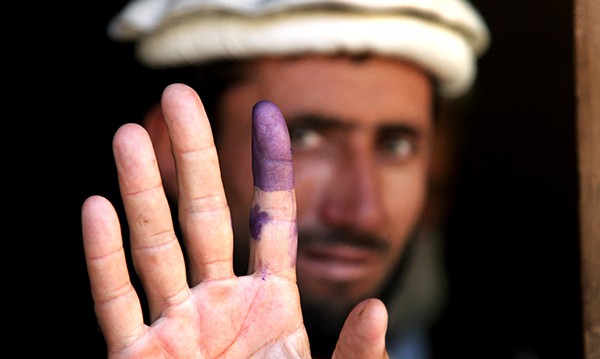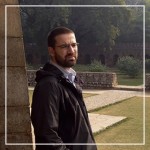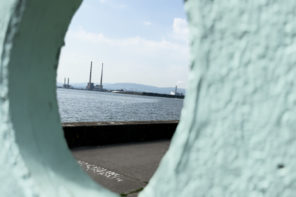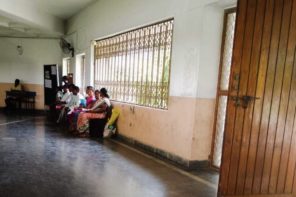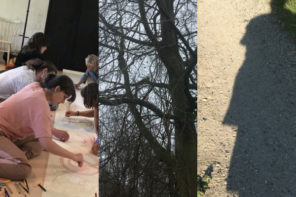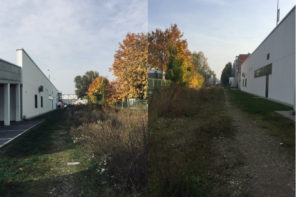The following is based on edited excerpts from the introduction of Derailing Democracy in Afghanistan: Elections in an Unstable Political Landscape as well as field notes from the 2014 Presidential and Provincial Council Elections.
On a cold rainy morning this April, I walked past half a dozen police vehicles that had blocked off the entrance to my hotel. While in Kabul I normally stay with friends or in a low-key guesthouse, but with multiple attacks in the city over the past few weeks, some specifically targeting the elections, I decided to be a little more careful with my security. Hoping in a Corolla driven by a friend, the streets were eerily quiet. As we crested the hill headed north outside of Kabul, however, the skies momentarily cleared, and we began to see more cars and pedestrians. Predictions that Afghans would stay away from the polls during these presidential and Provincial Council elections appeared unfounded.
It is clear that the international intervention in Afghanistan had not unfolded according to anyone’s expectations following the initial invasion in October 2001. The early estimates of a 3-year engagement by international diplomats and policy-makers seemed, in hindsight, incredible. With a national government widely perceived as predatory, an insurgency gripping the majority of a country that had initially welcomed the presence of NATO forces and countless failed development projects, many Afghans and internationals were left wondering, what had gone wrong?
Opinions varied: was this due to the failure to include the Taliban in preliminary negotiations at Bonn? Were the corrupt fumblings of Karzai and his advisors to blame? Was it the shift in American focus towards Iraq? Or was Afghanistan truly the graveyard of empires? Surprisingly missing from many of these debates have been the series of elections held in 2004, 2005, 2009 and 2010.
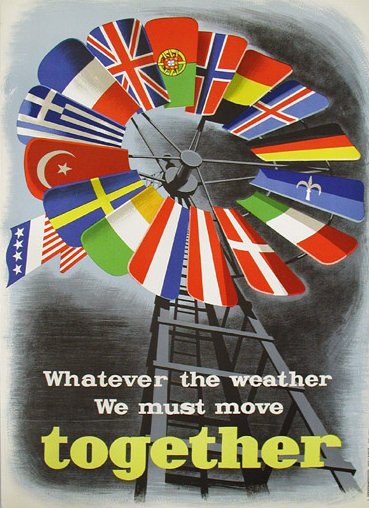
As the international community formulates what the transition out of Afghanistan will look like, many Afghans and international actors have dismissed elections as failed experiments in democracy. However, a combined decade in the country looking at issues of local politics and governance and discussing these with Afghans across the country has left us with a more disturbing question: Have elections actually contributed to the failure to establish a legitimate, representative government in Afghanistan? What if some of our most basic assumptions about what elections do are in fact unfounded? Is there a better way to understand elections and their impact on local politics?
We believe a careful look at the local political landscape in Afghanistan demonstrates that the way in which elections have been implemented over the course of the international intervention has cumulatively contributed to the destabilization of Afghanistan, and the widening of the gap between the government and the Afghan people. Representative governance – that is, an ideal form of political resource management in which elected representatives make decisions for the good of a given community – has suffered as a result. This is not to say that elections should not have occurred in Afghanistan at all, nor that the country was in some way “unready” for them.
Rather, we argue that the way elections were manipulated by the Afghan political elite – with the support of international actors who viewed elections as a primarily technical, as opposed to political, procedure – constitutes the root of the problem.
Elections are not solely, or even primarily, to blame for the failure to establish a truly representative government in Kabul. However, electoral processes did contribute to this failure. Specifically, the international community’s focus on technical aspects of the elections and the tendency of both the American government and the international media to see the simple holding of elections as a sign of success diverted the gaze of both Afghan and international observers from the more significant political processes that were taking place at a deeper level. Those looking for quick answers on how internationally-sponsored elections should be held in post-conflict situations will be disappointed. However, we do hope that the Afghan case will offer some suggestions on both an academic and a more practical level as to how we can sharpen our approaches and better understand how elections re-shape the lived political experiences of all involved.
The lines at polling stations in rural areas to the north of Kabul are surprisingly long. Some are even longer than they were in 2009. This is particularly remarkable because the rain and cool weather has made standing in line uncomfortable at best.
At polling stations the voting is orderly. There is always some chaos and confusion, particularly since the Provincial Council ballot has hundreds of names on it, but for the most part the voting is smooth, which makes sense since, for many voters this is the fifth time that they are casting ballots since 2005. Voters at the polling stations also seem positive, looking forward to a new government that is a break from the corrupt reign of Karzai. Especially as the day goes on and there are no reports of large scale attacks people seem satisfied with the process.
We have been working in Afghanistan since 2005, focusing particularly on elections since the campaign leading up to the 2009 elections. Through out our work had both benefited and suffered from the fact it is a collaborative project by an anthropologist and a political scientist. It treads the line between political science, political economy and anthropology, and this is problematic for some. Political scientists may complain about our lack of quantitative data, while some anthropologists may argue that we focus too much on structures and processes. Ultimately, however, we believe that this blending of approaches is critical in understanding politics as a “lived experience.” While this is more than a set of processes, it often takes place with a keen awareness and interpretation of certain processes and rules.
These, of course, can be followed or broken in different ways, and part why the Afghan elections are fascinating is the way in which rules have been both followed and broken – but an awareness of the rules still shape the way that politics are lived and decisions are made.
The issues of how individuals and communities respond to these structures and processes, and how these responses shape politics, are what occupy us for most of this work. Elections are one such process that we feel are a useful venue for observing politics in action. Particularly in Afghanistan, where competition is often hidden and motives are veiled, elections have been a rare case of at least quasi-public and active political debates. Furthermore, while the international community’s focus on elections seems to grow about six months before an election and peters out a month or two after, part of our argument is that a careful look at the past election cycles in Afghanistan reveals some important insights about how elections and other processes have long-lasting effects on politics in Afghanistan, far beyond the experience of a presidential or parliamentary poll every four or five years.
Interviewing voters in the days following the elections, one can feel the initial optimism slipping. Immediately there are accusations of fraud with multiple candidates declaring victory. In the June run off it appears there is even more fraud. There are accounts of thousands of votes casts in places where there had been almost none in the first round.
Candidates begin slinging accusations at each other. The Independent Election Commission is accused of massive fraud. Partial results are announced late. At the least, it seems, they are guilty of an ineffective counting procedures.
One man declares: “I thought I knew what democracy was, but now I am not sure what is happening.”
We believe that an approach that blends anthropology and political science is particularly effective for re-evaluating our understandings of elections, especially in the Afghan context. In the social sciences, elections have (with a few notable exceptions) been part of the domain of political science. Anthropology, historically rooted in the study of non-Western societies, has little history of studying elections, even while they are deeply shaped by issues that have traditionally interested anthropologists such as kinship, nationalism and class.
Political science approaches are useful for understanding the structures and procedures of elections, but by focusing on them as specific events, they tend to miss the way they are embedded in multiple layers of political and cultural struggles within both communities and nations. Elections take place within certain political cultures, but just as importantly, elections can reshape those political cultures. For this reason we have attempted to analyze elections as a part of wider political processes and debates encapsulated by the sociologist Pierre Bourdieu’s notion of “structuring structures” that create a certain political “habitus” for subjects – in this case, the political landscape in which individuals and communities live. Even while Bourdieu can be read as overly deterministic, we believe this landscape and the processes that take place in it, such as elections, do not dictate how an individual makes choices, but does shape the way that individuals think and feel as they make their choices.
John Kerry flies in to negotiate between the two final candidates. This is the second time that this has happened. With the supporters of one candidate accused of wide scale fraud and the supporters of the other threatening to turn already rowdy protests violent, there is talk of setting up a parallel government. Elections seem to have taken an already weak government and pushed it towards the brink.
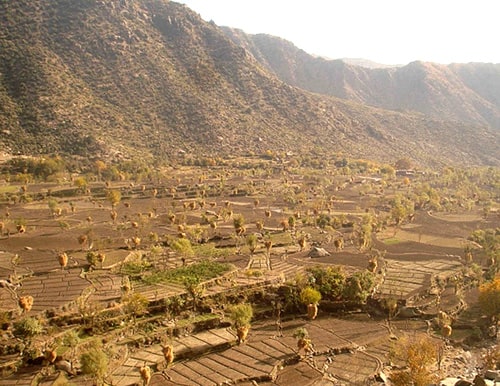
At the same time, however, elections are themselves structured by a series of additional political ideals and notions that in turn shape the way voters perceive and act in the election experience.
In Paktia, strong tribal ties and an emphasis on kinship leads individuals to vote together as a family more frequently than would be expected in Western instances. This in turn shapes campaigns in which candidates try to secure entire blocs of votes. In this case, while individuals’ political experience is being reshaped by elections, the political habitus of these individuals (and the communities of which they are a part) is also reshaping the elections themselves.
In some instances clashes can occur between accepted social norms and the political processes of elections, leaving voters to debate and reformulate aspects of their political worlds. As a result, while the one person, one-vote balloting system suggests that all individuals have an equal voice in the election process, in conservative Paktia it is rare for women to leave their large family compounds. The mere extension of voting rights to women has created a good deal of debate at multiple levels of Afghan political society across the country over the wider role of women in the public sphere. While in many instances these debates reflect political conflict, there is also a certain amount of opportunity for individuals to negotiate and create new forms of power. For example, a common recent form of fraud has involved men coming to polling centers with a stack of voter registration cards asking to cast votes on behalf of their “female relatives.” This strategy exploits a combination of the modern technical nuances of the balloting process and local conservative values to secure more votes for a family. At the same time, in some areas women have been able to cast votes independently and without intimidation at polling centers, negotiating a new, albeit limited political space in the public sphere.
In order to fit some of these elements into our analysis, we study the part elections play in the process of political ordering and structuring of society, but at the same time look at how elections themselves are being shaped and structured by other social and political conditions. Elections may therefore provide a structure within which an individual must make a series of choices (to vote or not to vote; to vote collectively or according to differing individual convictions, etc), but at the same time the way that elections are understood culturally, the history of previous elections in the country and many other factors will all shape how they are held.
For example, we will see that fraud in the elections of 2004, 2005 and 2009 directly contributed to fraud in 2010, since political actors increasingly learned how to manipulate the system using illegal means and saw electoral fraud as an increasingly viable political option.
Viewing elections with this broader lens leads us to expand the kind of questions we ask about them far beyond simply establishing who won or lost. How was the election won? What resources were used? How do people talk about the election in relation to other political struggles? What groups gained or lost political capital? What types of rhetoric, old or new, were used to mobilize voters? What does this mean on both a macro and micro level for politics within a community?

